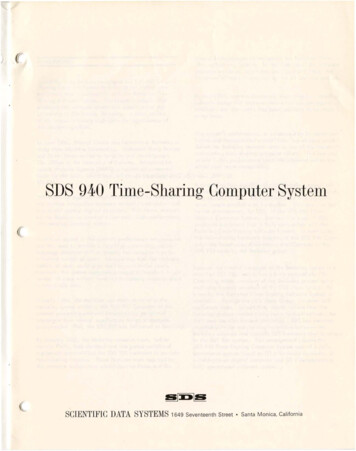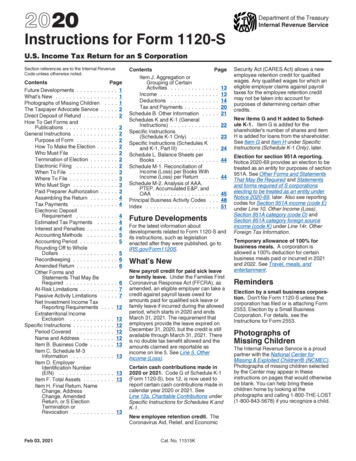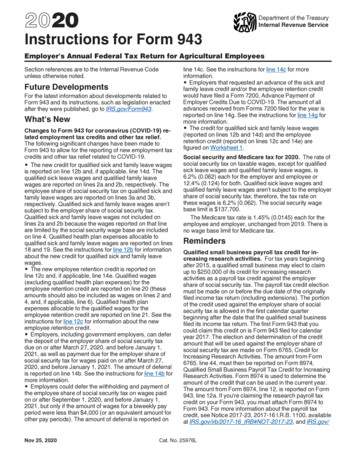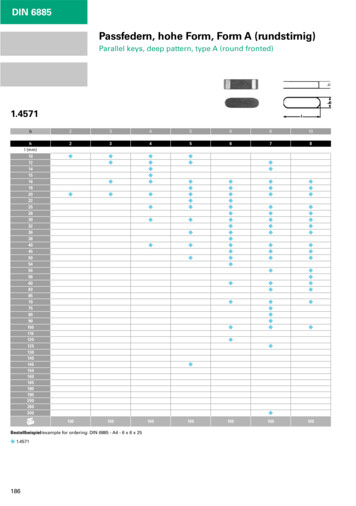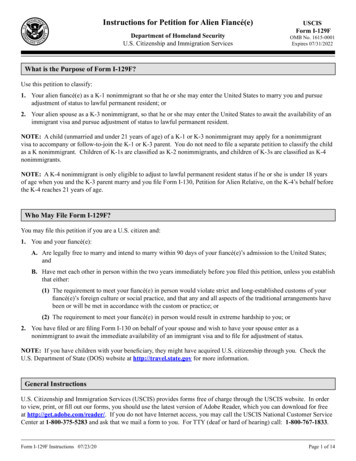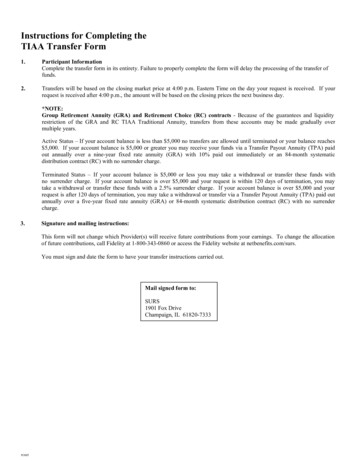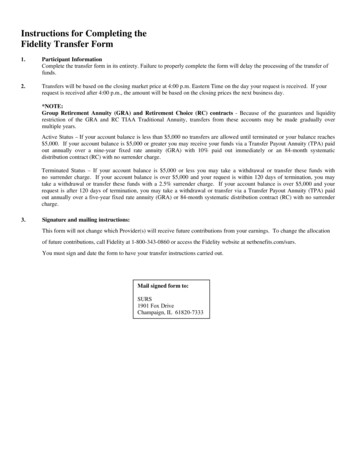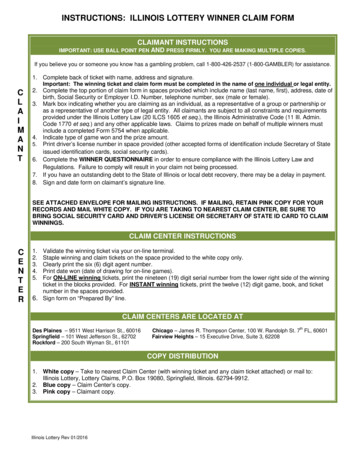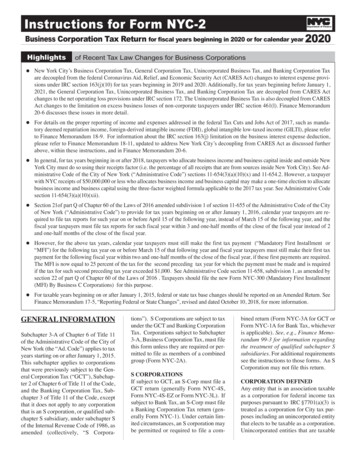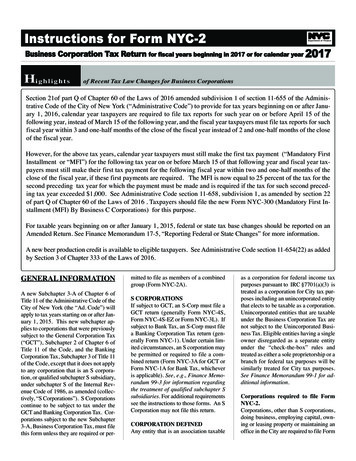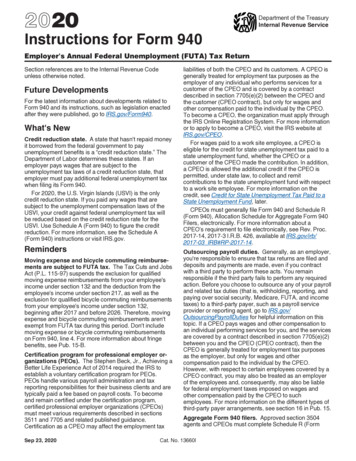
Transcription
2020Instructions for Form 940Department of the TreasuryInternal Revenue ServiceEmployer's Annual Federal Unemployment (FUTA) Tax ReturnSection references are to the Internal Revenue Codeunless otherwise noted.Future DevelopmentsFor the latest information about developments related toForm 940 and its instructions, such as legislation enactedafter they were published, go to IRS.gov/Form940.What's NewCredit reduction state. A state that hasn't repaid moneyit borrowed from the federal government to payunemployment benefits is a “credit reduction state.” TheDepartment of Labor determines these states. If anemployer pays wages that are subject to theunemployment tax laws of a credit reduction state, thatemployer must pay additional federal unemployment taxwhen filing its Form 940.For 2020, the U.S. Virgin Islands (USVI) is the onlycredit reduction state. If you paid any wages that aresubject to the unemployment compensation laws of theUSVI, your credit against federal unemployment tax willbe reduced based on the credit reduction rate for theUSVI. Use Schedule A (Form 940) to figure the creditreduction. For more information, see the Schedule A(Form 940) instructions or visit IRS.gov.RemindersMoving expense and bicycle commuting reimbursements are subject to FUTA tax. The Tax Cuts and JobsAct (P.L. 115-97) suspends the exclusion for qualifiedmoving expense reimbursements from your employee'sincome under section 132 and the deduction from theemployee's income under section 217, as well as theexclusion for qualified bicycle commuting reimbursementsfrom your employee's income under section 132,beginning after 2017 and before 2026. Therefore, movingexpense and bicycle commuting reimbursements aren'texempt from FUTA tax during this period. Don't includemoving expense or bicycle commuting reimbursementson Form 940, line 4. For more information about fringebenefits, see Pub. 15-B.Certification program for professional employer organizations (PEOs). The Stephen Beck, Jr., Achieving aBetter Life Experience Act of 2014 required the IRS toestablish a voluntary certification program for PEOs.PEOs handle various payroll administration and taxreporting responsibilities for their business clients and aretypically paid a fee based on payroll costs. To becomeand remain certified under the certification program,certified professional employer organizations (CPEOs)must meet various requirements described in sections3511 and 7705 and related published guidance.Certification as a CPEO may affect the employment taxSep 23, 2020liabilities of both the CPEO and its customers. A CPEO isgenerally treated for employment tax purposes as theemployer of any individual who performs services for acustomer of the CPEO and is covered by a contractdescribed in section 7705(e)(2) between the CPEO andthe customer (CPEO contract), but only for wages andother compensation paid to the individual by the CPEO.To become a CPEO, the organization must apply throughthe IRS Online Registration System. For more informationor to apply to become a CPEO, visit the IRS website atIRS.gov/CPEO.For wages paid to a work site employee, a CPEO iseligible for the credit for state unemployment tax paid to astate unemployment fund, whether the CPEO or acustomer of the CPEO made the contribution. In addition,a CPEO is allowed the additional credit if the CPEO ispermitted, under state law, to collect and remitcontributions to the state unemployment fund with respectto a work site employee. For more information on thecredit, see Credit for State Unemployment Tax Paid to aState Unemployment Fund, later.CPEOs must generally file Form 940 and Schedule R(Form 940), Allocation Schedule for Aggregate Form 940Filers, electronically. For more information about aCPEO’s requirement to file electronically, see Rev. Proc.2017-14, 2017-3 I.R.B. 426, available at IRS.gov/irb/2017-03 IRB#RP-2017-14.Outsourcing payroll duties. Generally, as an employer,you're responsible to ensure that tax returns are filed anddeposits and payments are made, even if you contractwith a third party to perform these acts. You remainresponsible if the third party fails to perform any requiredaction. Before you choose to outsource any of your payrolland related tax duties (that is, withholding, reporting, andpaying over social security, Medicare, FUTA, and incometaxes) to a third-party payer, such as a payroll serviceprovider or reporting agent, go to IRS.gov/OutsourcingPayrollDuties for helpful information on thistopic. If a CPEO pays wages and other compensation toan individual performing services for you, and the servicesare covered by a contract described in section 7705(e)(2)between you and the CPEO (CPEO contract), then theCPEO is generally treated for employment tax purposesas the employer, but only for wages and othercompensation paid to the individual by the CPEO.However, with respect to certain employees covered by aCPEO contract, you may also be treated as an employerof the employees and, consequently, may also be liablefor federal employment taxes imposed on wages andother compensation paid by the CPEO to suchemployees. For more information on the different types ofthird-party payer arrangements, see section 16 in Pub. 15.Aggregate Form 940 filers. Approved section 3504agents and CPEOs must complete Schedule R (FormCat. No. 13660I
For EFTPS, go to EFTPS.gov, or call one of thenumbers provided under Federal tax deposits must bemade by electronic funds transfer (EFT), earlier.Electronic funds withdrawal (EFW). If you file Form940 electronically, you can e-file and use EFW to pay thebalance due in a single step using tax preparationsoftware or through a tax professional. However, don't useEFW to make federal tax deposits. For more informationon paying your taxes using EFW, go to IRS.gov/EFW.940) when filing an aggregate Form 940. AggregateForms 940 are filed by agents of home care servicerecipients approved by the IRS under section 3504. Torequest approval to act as an agent for an employer, theagent files Form 2678 with the IRS unless you’re a state orlocal government agency acting as an agent under thespecial procedures provided in Rev. Proc. 2013-39,2013-52 I.R.B. 830, available at IRS.gov/irb/2013-52 IRB#RP-2013-39.Aggregate Forms 940 are also filed by CPEOsapproved by the IRS under section 7705. CPEOs fileForm 8973, Certified Professional Employer Organization/Customer Reporting Agreement, to notify the IRS thatthey started or ended a service contract with a customer.CPEOs must generally file Form 940 and Schedule Relectronically. For more information about a CPEO'srequirement to file electronically, see Rev. Proc. 2017-14,2017-3 I.R.B. 426, available at IRS.gov/irb/2017-03 IRB#RP-2017-14.Credit or debit card payments. You may pay yourFUTA tax shown on line 14 using a credit or debit card.Your payment will be processed by a payment processorwho will charge a processing fee. Don't use a credit ordebit card to pay taxes that are required to be deposited(see When Must You Deposit Your FUTA Tax, later). Formore information on paying your taxes with a credit ordebit card, go to IRS.gov/PayByCard.Online payment agreement. You may be eligible toapply for an installment agreement online if you can't paythe full amount of tax you owe when you file your return.For more information, see What if you can't pay in full,later.If you change your business name, business address, or responsible party. Notify the IRS immediatelyif you change your business name, business address, orresponsible party. Write to the IRS office where you file your returns (usingthe Without a payment address under Where Do You File,later) to notify the IRS of any business name change. SeePub. 1635 to see if you need to apply for a new employeridentification number (EIN). Complete and mail Form 8822-B to notify the IRS of abusiness address or responsible party change. Don’t mailForm 8822-B with your Form 940. For a definition of“responsible party,” see the Instructions for Form SS-4.Disregarded entities and qualified subchapter S subsidiaries (QSubs). Business entities that aredisregarded as separate from their owner, includingQSubs, are required to withhold and pay employmenttaxes and file employment tax returns using the name andEIN of the disregarded entity. For more information, seeDisregarded entities, later.State unemployment information. When youregistered as an employer with your state, the stateassigned you a state reporting number. If you don't have astate unemployment account and state experience taxrate, or if you have questions about your state account,you must contact your state unemployment agency. For alist of state unemployment agencies, visit the U.S.Department of Labor's website at oui.doleta.gov/unemploy/agencies.asp.Federal tax deposits must be made by electronicfunds transfer (EFT). You must use EFT to make allfederal tax deposits. Generally, an EFT is made using theElectronic Federal Tax Payment System (EFTPS). If youdon't want to use EFTPS, you can arrange for your taxprofessional, financial institution, payroll service, or othertrusted third party to make electronic deposits on yourbehalf. Also, you may arrange for your financial institutionto initiate a same-day wire payment on your behalf.EFTPS is a free service provided by the Department of theTreasury. Services provided by your tax professional,financial institution, payroll service, or other third partymay have a fee.For more information on making federal tax deposits,see section 11 of Pub. 15. To get more information aboutEFTPS or to enroll in EFTPS, go to EFTPS.gov, or call800-555-4477, 800-733-4829 (TDD), or 800-244-4829(Spanish). Additional information about EFTPS is alsoavailable in Pub. 966.Photographs of missing children. The IRS is a proudpartner with the National Center for Missing & ExploitedChildren (NCMEC). Photographs of missing childrenselected by the Center may appear in instructions onpages that would otherwise be blank. You can help bringthese children home by looking at the photographs andcalling 1-800-THE-LOST (1-800-843-5678) if yourecognize a child.How Can You Get More Help?If you want more information about this form, see Pub. 15,visit our website at IRS.gov, or call the Business andSpecialty Tax Line toll free at 800-829-4933 or800-829-4059 (TDD/TTY for persons who are deaf, hardof hearing, or have a speech disability), Monday–Fridayfrom 7:00 a.m. to 7:00 p.m. local time (Alaska and Hawaiifollow Pacific time).Electronic filing and payment. Businesses can enjoythe benefits of filing and paying their federal taxeselectronically. Whether you rely on a tax professional orhandle your own taxes, the IRS offers you convenientprograms to make filing and paying easier. Spend lesstime worrying about taxes and more time running yourbusiness. Use e-file and EFTPS to your benefit. For e-file, go to IRS.gov/EmploymentEfile for additionalinformation. A fee may be charged to file electronically.For a list of related employment tax topics, go toIRS.gov/EmploymentTaxes. You can order forms,instructions, and publications at IRS.gov/OrderForms.-2-Instructions for Form 940 (2020)
FUTA taxes for your household employees on Form 940instead of filing Schedule H (Form 1040). If you choose toinclude household employees on your Form 940, youmust also file Form 941, Employer's QUARTERLYFederal Tax Return; Form 943, Employer's AnnualFederal Tax Return for Agricultural Employees; or Form944, Employer's ANNUAL Federal Tax Return, to reportsocial security, Medicare, and any withheld federalincome taxes for your household employees. See Pub.926 for more information.General InstructionsWhat's the Purpose of Form 940?These instructions give you some background informationabout Form 940. They tell you who must file the form, howto fill it out line by line, and when and where to file it.Use Form 940 to report your annual FederalUnemployment Tax Act (FUTA) tax. Together with stateunemployment tax systems, the FUTA tax provides fundsfor paying unemployment compensation to workers whohave lost their jobs. Most employers pay both a federaland a state unemployment tax. Only employers pay FUTAtax. Don't collect or deduct FUTA tax from youremployees' wages.For Agricultural Employers . . .File Form 940 if you answer “Yes” to either of thesequestions. Did you pay cash wages of 20,000 or more tofarmworkers during any calendar quarter in 2019 or 2020? Did you employ 10 or more farmworkers during somepart of the day (whether or not at the same time) duringany 20 or more different weeks in 2019 or 20 or moredifferent weeks in 2020?The FUTA tax applies to the first 7,000 you pay toeach employee during a calendar year after subtractingany payments exempt from FUTA tax.Who Must File Form 940?Count wages you paid to aliens who were admitted tothe United States on a temporary basis to performfarmwork (workers with H-2A visas). However, wagespaid to “H-2A visa workers” aren't subject to FUTA tax.See Pub. 51 for more information.Except as noted below, if you answer “Yes” to either oneof these questions, you must file Form 940. Did you pay wages of 1,500 or more to employees inany calendar quarter during 2019 or 2020? Did you have one or more employees for at least somepart of a day in any 20 or more different weeks in 2019 or20 or more different weeks in 2020? Count all full-time,part-time, and temporary employees. However, if yourbusiness is a partnership, don't count its partners.For Indian Tribal Governments . . .Services rendered by employees of a federally recognizedIndian tribal government employer (including anysubdivision, subsidiary, or business enterprise whollyowned by the tribe) are exempt from FUTA tax and noForm 940 is required. However, the tribe must haveparticipated in the state unemployment system for the fullyear and be in compliance with applicable stateunemployment law. For more information, see section3309(d).If your business was sold or transferred during the year,each employer who answered “Yes” to at least onequestion above must file Form 940. However, don'tinclude any wages paid by the predecessor employer onyour Form 940 unless you’re a successor employer. Fordetails, see Successor employer under Type of Return,later.For Tax-Exempt Organizations . . .If you’re not liable for FUTA tax for 2020 because youmade no payments to employees in 2020, check box c inthe top right corner of the form. Then go to Part 7, sign theform, and file it with the IRS.Religious, educational, scientific, charitable, and otherorganizations described in section 501(c)(3) and exemptfrom tax under section 501(a) aren't subject to FUTA taxand don't have to file Form 940.If you won’t be liable for filing Form 940 in the futurebecause your business has closed or because youstopped paying wages, check box d in the top right cornerof the form. For more information, see Final: Businessclosed or stopped paying wages under Type of Return,later.For State or Local Government Employers . . .Services rendered by employees of a state, or a politicalsubdivision or instrumentality of the state, are exemptfrom FUTA tax and no Form 940 is required.When Must You File Form 940?For Employers of Household Employees . . .The due date for filing Form 940 for 2020 is February 1,2021. However, if you deposited all your FUTA tax when itwas due, you may file Form 940 by February 10, 2021.If you’re a household employer, you must pay FUTA taxon wages that you paid to your household employees onlyif you paid cash wages of 1,000 or more in any calendarquarter in 2019 or 2020.If we receive Form 940 after the due date, we will treatForm 940 as filed on time if the envelope containing Form940 is properly addressed, contains sufficient postage,and is postmarked by the U.S. Postal Service on or beforethe due date, or sent by an IRS-designated privatedelivery service (PDS) on or before the due date.However, if you don't follow these guidelines, we willgenerally consider Form 940 filed when it is actuallyreceived. For more information about PDSs, see WhereDo You File, later.A household employee performs household work in a: Private home, Local college club, or Local chapter of a college fraternity or sorority.Generally, employers of household employees must fileSchedule H (Form 1040) instead of Form 940.However, if you have other employees in addition tohousehold employees, you can choose to include theInstructions for Form 940 (2020)-3-
If any due date for filing falls on a Saturday, Sunday, orlegal holiday, you may file your return on the nextbusiness day.PDSs can't deliver to P.O. boxes. You must use theU.S. Postal Service to mail an item to a P.O. box address.Go to IRS.gov/PDS for the current list of PDSs. For theIRS mailing address to use if you’re using a PDS, go toIRS.gov/PDSstreetAddresses. Select the mailing addresslisted on the webpage that is in the same state as theaddress to which you would mail returns filed without apayment, as shown in the table that follows.Where Do You File?You’re encouraged to file Form 940 electronically. Go toIRS.gov/EmploymentEfile for more information onelectronic filing. If you file a paper return, where you filedepends on whether you include a payment with Form940. Mail your return to the address listed for your locationin the table that follows.Mailing Addresses for Form 940If you’re in . . .Without a payment . . .Connecticut, Delaware, District of Columbia, Georgia,Illinois, Indiana, Kentucky, Maine, Maryland,Massachusetts, Michigan, New Hampshire, New Jersey,New York, North Carolina, Ohio, Pennsylvania, RhodeIsland, South Carolina, Tennessee, Vermont, Virginia,West Virginia, WisconsinDepartment of the Treasury Internal Revenue ServiceInternal Revenue ServiceP.O. Box 806531Kansas City, MOCincinnati, OH 45280-653164999-0046Alabama, Alaska, Arizona, Arkansas, California,Colorado, Florida, Hawaii, Idaho, Iowa, Kansas,Louisiana, Minnesota, Mississippi, Missouri, Montana,Nebraska, Nevada, New Mexico, North Dakota,Oklahoma, Oregon, South Dakota, Texas, Utah,Washington, WyomingDepartment of the Treasury Internal Revenue ServiceInternal Revenue ServiceP.O. Box 932000Ogden, UT 84201-0046Louisville, KY 40293-2000Puerto Rico, U.S. Virgin IslandsInternal Revenue ServiceP.O. Box 409101Ogden, UT 84409Internal Revenue ServiceP.O. Box 932000Louisville, KY 40293-2000If the location of your legal residence, principal place ofbusiness, office, or agency is not listedInternal Revenue ServiceP.O. Box 409101Ogden, UT 84409Internal Revenue ServiceP.O. Box 932000Louisville, KY 40293-2000EXCEPTION for tax-exempt organizations; federal, state,and local governments; and Indian tribal governments,regardless of your locationDepartment of the Treasury Internal Revenue ServiceInternal Revenue ServiceP.O. Box 932000Ogden, UT 84201-0046Louisville, KY 40293-2000!CAUTIONYour filing address may have changed from thatused to file your employment tax return in prioryears.With a payment . . .state requires an employer to make to its unemploymentfund for the payment of unemployment benefits. Theydon't include: Any payments deducted or deductible from youremployees' pay; Penalties, interest, or special administrative taxes; and Voluntary amounts you paid to get a lower assignedstate experience rate.Credit for State Unemployment TaxPaid to a State Unemployment FundGenerally, you get a credit for amounts you pay to a state(including the District of Columbia, Puerto Rico, and theUSVI) unemployment fund by February 1, 2021 (orFebruary 10, 2021, if that is your Form 940 due date).Your FUTA tax will be higher if you don't pay the stateunemployment tax timely. If you didn't pay all stateunemployment tax by the due date of Form 940, see theline 10 instructions. For wages paid to a work siteemployee, a CPEO is eligible for the credit whether theCPEO or a customer of the CPEO made the contributionwith respect to a work site employee.Additional credit. You may receive an additional creditif you have a state experien
financial institution, payroll service, or other third party may have a fee. For more information on making federal tax deposits, see section 11 of Pub. 15. To get more information about EFTPS or to enroll in EFTPS, go to EFTPS.gov, or call 800-555-4477, 800-733-4829 (TDD), or 800-244-4

